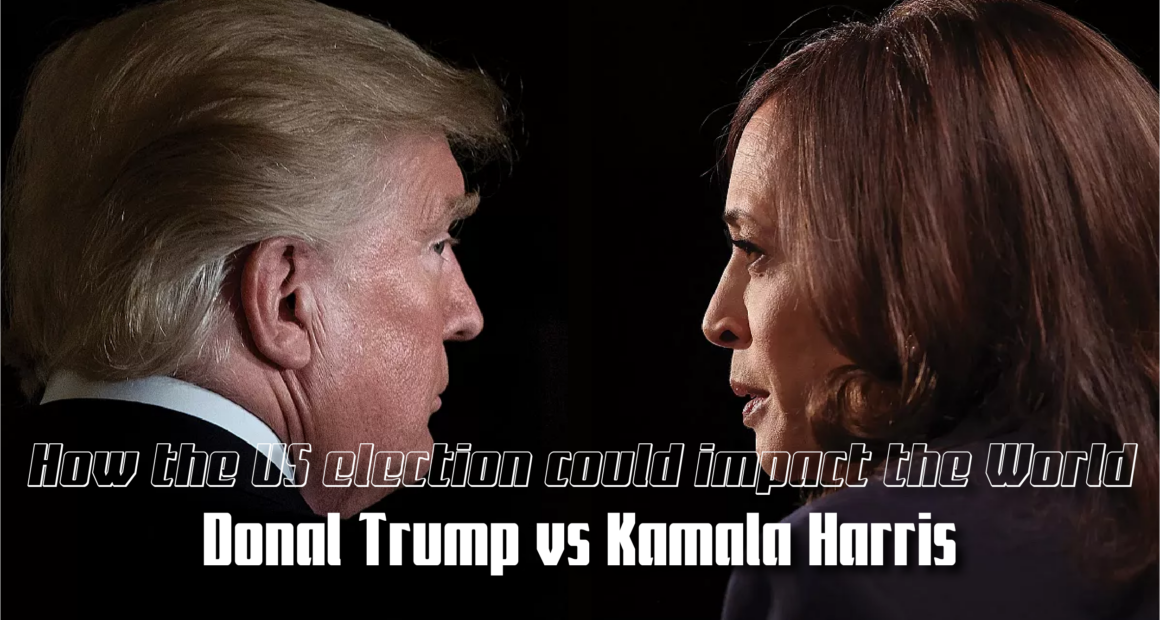The U.S. presidential election can significantly influence global dynamics, particularly with candidates like Donald Trump and Kamala Harris, who represent contrasting political ideologies and approaches. Here’s a detailed analysis of how their potential presidencies could impact the world:
1. Foreign Policy Direction
Donald Trump
- America First: Trump’s foreign policy is rooted in nationalism, emphasizing American interests over global cooperation. This could lead to reduced U.S. involvement in international agreements and organizations.
- Confrontational Stance: Expect a tougher approach toward adversaries like China and Russia, potentially increasing tensions and leading to a more fragmented global order.
Kamala Harris
- Multilateral Engagement: Harris would likely favor re-engagement with international alliances and organizations, promoting collective action on issues like climate change and security.
- Focus on Diplomacy: She may prioritize diplomatic solutions and dialogue, potentially easing tensions with rivals and fostering a more collaborative international atmosphere.
2. Economic Implications
Donald Trump
- Trade Policies: Trump may continue or escalate tariffs on China and other nations, leading to trade wars that could disrupt global supply chains and economic stability.
- Protectionism: An emphasis on protectionist policies could strain relationships with allies and trading partners, impacting global trade dynamics.
Kamala Harris
- Trade Agreements: Harris might seek to renegotiate trade agreements to foster cooperation rather than conflict, potentially stabilizing international trade relations.
- Support for Global Economy: A more open trade policy could enhance global economic growth, benefiting both the U.S. and its partners.
3. Climate Change and Environmental Policy
Donald Trump
- Withdrawal from Agreements: Trump’s administration previously withdrew from the Paris Agreement and may continue to prioritize fossil fuels over renewable energy, undermining global climate efforts.
- Limited International Cooperation: This could hinder collective action on climate change, affecting global environmental initiatives and exacerbating climate-related challenges.
Kamala Harris
- Commitment to Climate Action: Harris would likely rejoin and actively participate in international climate agreements, promoting ambitious climate goals.
- Global Leadership: Her administration could lead efforts to foster international cooperation on renewable energy and climate adaptation, positively influencing global environmental policies.
4. Security and Military Strategy
Donald Trump
- Military Expansion: Trump may advocate for increased military spending and a more aggressive posture in regions like Asia and the Middle East, potentially escalating tensions.
- Focus on National Sovereignty: His approach could lead to strained relationships with NATO allies, as he might prioritize U.S. interests over collective security.
Kamala Harris
- Balanced Approach: Harris might focus on maintaining a strong military presence while emphasizing diplomacy, seeking to resolve conflicts through negotiation rather than military action.
- Support for Alliances: Strengthening NATO and partnerships in the Indo-Pacific could enhance global security and foster collaborative defense initiatives.
5. Human Rights and Democracy Promotion
Donald Trump
- Pragmatic Approach: Trump’s administration has shown a tendency to prioritize strategic interests over human rights concerns, which could embolden authoritarian regimes.
- Limited Advocacy: A lack of emphasis on democracy promotion may lead to a decline in U.S. influence in advocating for human rights globally.
Kamala Harris
- Advocacy for Human Rights: Harris is likely to emphasize human rights and democracy promotion, potentially supporting movements for democratic governance in authoritarian regimes.
- Balancing Act: She would face the challenge of addressing human rights while maintaining strategic relationships, particularly with nations like China.
6. Global Health Initiatives
Donald Trump
- National Focus: Trump may prioritize domestic health issues, leading to less international cooperation on global health crises, such as pandemics.
- Reduced Funding: Potential cuts to international health organizations could hinder global health responses, impacting vulnerable populations.
Kamala Harris
- Global Health Leadership: Harris would likely prioritize global health initiatives, working to strengthen international cooperation on issues like pandemic response and vaccine distribution.
- Increased Funding: A commitment to funding global health organizations could enhance global preparedness for health crises.
Conclusion
The choice between Donald Trump and Kamala Harris in the U.S. presidential election presents a stark contrast in vision and policy that could shape the world in significant ways.
- Trump’s presidency might lead to increased isolationism, trade conflicts, and a focus on national interests, potentially destabilizing international relationships and global governance.
- Harris’s leadership, on the other hand, could foster a more collaborative and multilateral approach, emphasizing diplomacy, climate action, and human rights, promoting a more stable and cooperative international landscape.
Ultimately, the impact on the world will depend not only on the chosen candidate but also on how effectively they can navigate complex global challenges and engage with other nations in an increasingly interconnected world.





